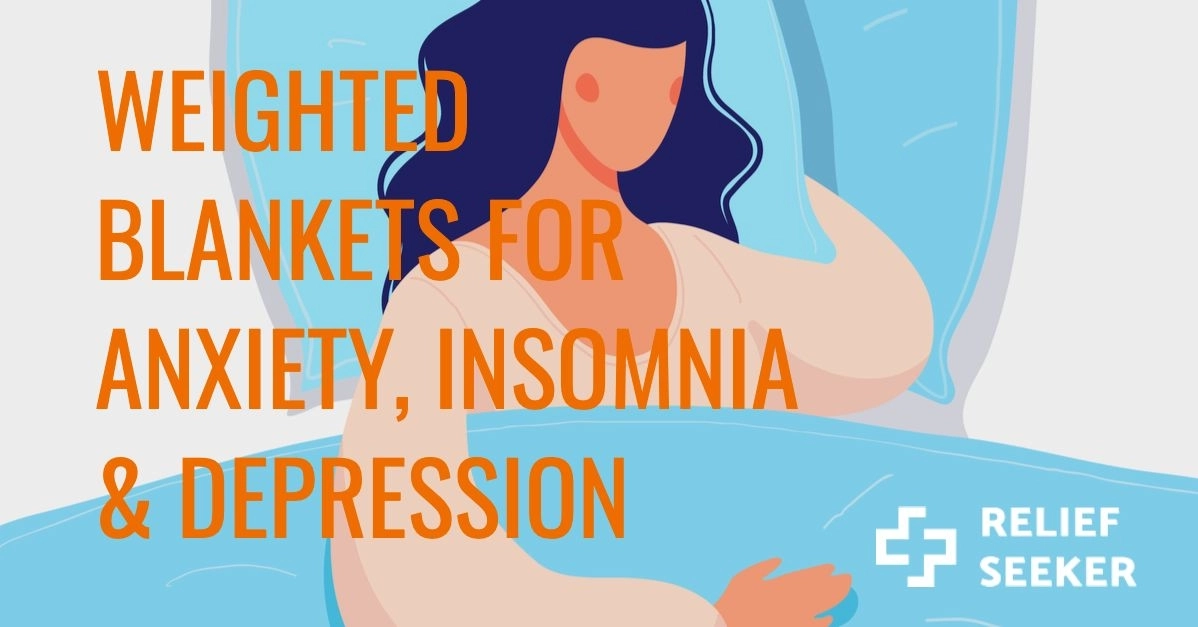Weighted blankets aren’t new to the world of sleep disorders, anxiety, and insomnia. In fact, researchers have been studying the effects of pressure therapy on adults and children for decades.
Applying light pressure on the body and pressure points may provide a huge host of mental health and wellness benefits, including reducing anxiety while supporting the nervous system.
If you suffer from related conditions, find out if weighted blankets for anxiety, insomnia, depression (or a few other conditions) may help alleviate your symptoms.
Benefits of a Weighted Blanket
Weighted blanket companies tout a long list of benefits. These companies claim that a blanket weighing between 8 and 20 pounds can reduce the symptoms of various health conditions, ranging from insomnia and anxiety to poor circulation and even attention deficit hyperactivity disorder (ADHD).
Not surprisingly, manufacturers of these blankets claim their products can work wonders for solving sleep disorder issues, like anxiety disorder and restless leg syndrome.
But the cool thing about weighted blankets is that they may also help ease the symptoms of other issues, such as weight management, poor circulation, depression, and menopause.
Weighted blankets can help patients suffering from:
- ADHD
- Anxiety
- Depression
- Insomnia
- Menopause
- Poor circulation
- Weight management issues
Do Weighted Blankets Work?
Weighted blankets work to help reduce the symptoms of chronic conditions in a variety of ways. The main idea is that a weighted blanket for a child or adult is like a baby's swaddle.
Weighted blankets use pressure therapy to help reduce your heart rate and calm your breathing.
One of the main benefits of using a weighted blanket is reduced anxiety — especially when falling asleep. If you can get a solid eight hours of sleep each night, you’re less likely to experience the chronic conditions related to insomnia, like weight management issues, depression, and anxiety.
Weighted Blankets Research
But what do researchers say about weighted blankets? Is all the evidence merely anecdotal? Or is there some science behind all this added sleepy-time weight?
The Journal of Sleep Medicine and Disorders published a study in 2015, stating that four out of five subjects in a sleep study preferred a weighted blanket.
Yet, there isn’t much hard data on these blankets — though that doesn’t mean they don’t work.
Dr. Christina Cusin, assistant professor of psychiatry at Harvard Medical School, states, "Weighted blankets have been around for a long time, especially for kids with autism or behavioral disturbances. It is one of the sensory tools commonly used in psychiatric units. Patients who are in distress may choose different types of sensory activities — holding a cold object, smelling particular aromas, manipulating dough, building objects, doing arts and crafts — to try to calm down."
How Heavy Should a Weighted Blanket Be?
There’s some debate about how heavy your weighted blanket should be. But experts generally agree that a weighted blanket should weigh about 10% of your body weight. For example, if you weigh 150 pounds, you should buy a 15-pound blanket.
Yet these numbers are merely starting points. You may want to try out a weighted blanket and see how the weight makes you feel. If your blanket is disturbing your sleep, it may be too heavy.
It would also be best if you never bought a weighted blanket for a child without first checking with your pediatrician. Weighted blankets aren’t healthy for everyone (see the last section on the safety of these blankets), so individual needs may differ depending on preexisting conditions.
The 10% rule doesn’t apply to children, as many little ones have different needs than adults. Some kids can also feel overwhelmed by a weighted blanket at first, so it’s always best to check with your pediatrician before introducing such a blanket into your sleep routine.
Weighted Blankets for Anxiety
One of the main conditions treated by weighted blankets is anxiety. In fact, reduced anxiety is the no. 1 benefit of a weighted blanket touted by most manufacturers. These blankets can reduce anxiety by lowering your heart rate and allowing you to fall asleep faster.
Weighted blankets stimulated deep pressure touch (also known as deep pressure stimulation) to reduce anxiety. While we need more research on this therapy, many studies show that deep pressure touch (DPT) reduces anxiety by lowering the heart rate and slowing breathing.
Weighted Blankets for Insomnia
Weighted blankets are also beneficial in treating insomnia. Since anxiety and insomnia are two closely related disorders, it’s no surprise that treating one can also help reduce symptoms of the other.
Yet, weighted blankets can also help patients stay asleep longer, wake up fewer times during the night, and feel more rested throughout the day.
According to the Journal of Sleep Medicine, positive effects of a weighted blanket on insomnia include:
- Beneficial calming effects
- Alleviation of anxiety
- Calming and relaxing effect in children with autism
Weighted blankets may also prevent excess movement throughout the night. Since sudden movements are known to wake up patients, reducing these movements may contribute to a more restful night’s sleep.
Weighted Blankets for Depression
Weighted blankets can mimic human touch, creating a calming sensation for patients. Human touch has been linked to lower cortisol levels (a stress hormone), increases circulation, and increases oxytocin, dopamine, and serotonin levels.
Oxytocin and serotonin are two hormones known as the happiness hormones. Serotonin can also reduce pain levels.
The reduction in cortisol levels while increasing serotonin levels is one way that doctors treat depression. Selective serotonin reuptake inhibitors (SSRIs) such as Zoloft and Paxil, help increase the body's serotonin levels.
Oxytocin (also known as the love drug or the love hormone) produces well-being and content feelings.
By reducing cortisol levels and increasing oxytocin and serotonin, weighted blankets can help combat depression throughout the night, and the effects can last through the next day.
Other Uses for Weighted Blankets
The main use of weighted blankets is treating insomnia, anxiety, and depression. Yet, these blankets are also being used to treat a long list of other conditions too. Some of the most common conditions include:
- Weight management
- Menopause
- Poor circulation
- ADHD
Weight Management
While weighted blankets are still being tested in their efficacy in helping the body release weight, there is some anecdotal evidence that they can do just that.
There’s also a link between obesity and depression, anxiety, and insomnia. Cure these three conditions, and you may find it easier to release excess weight.
Some researchers are currently studying whether or not weighted blankets can help speed up metabolism during the night, too.
Even if the above studies don’t hold water, we know that these blankets positively affect anxiety, stress, and sleep patterns, which may lead to weight loss.
Menopause
Another benefit of weighted blankets is their cooling properties. While not all weighted blankets may help reduce body temperature, some do offer cooling technologies.
One of the most uncomfortable symptoms of menopause is hot flashes, which often happen at night.
Menopause can also be flanked by added anxiety and insomnia, thanks to fluctuating hormones. Weighted blankets may also ease some of these symptoms too.
Poor Circulation
When it comes to circulation, the jury is still out on weighted blankets. Some people find weighted blankets increase poor circulation, while others find that the blanket's intense weight actually decreases circulation.
If you suffer from poor circulation, we recommend chatting with an online doctor before buying a weighted blanket — to rule out any conditions that might worsen with this product.
ADHD/Autism
Parents have been using weighted blankets on their autistic and ADHD kids for years. While some kids on the spectrum might find a weighted blanket more stressful than beneficial, many little ones find the extra weight comforting as they slip off into dreamland.
These blankets can help calm nerves, increase circulation, and increase serotonin, helping calm kids with ADHD and autism.
Manufacturers make special weighted blankets just for kids. These blankets aren’t as heavy as adults and often contain special weighted beads that feel less intense and don’t cluster in one area of the blanket.
Again, check with your pediatrician before investing in a weighted blanket for your little one.
Best Weighted Blankets for Anxiety, Insomnia & Depression
There are dozens of weighted blankets saturating the market these days. You’ll find blankets weighted with glass beads, plastic pellets, and all-natural materials. There are blankets for kids, people with different conditions, and patients with sleep disorders.
Gravity Blanket
The Gravity Blanket is a machine-washable heavy blanket that promotes restful sleep. One of the largest startups on this list, Gravity, sells a long list of blankets, comforters, robes, sleep masks, and duvet covers.
Starts at: $189
Luna Blanket
The Luna Blanket offers deep touch pressure that feels lightweight. This cooling blanket is filled with glass beads distributed evenly throughout its fibers to ensure a comfortable night’s sleep. Beads are women into 100% organic cotton material.
Starts at: $40
YnM
YnM is another cooling weighted blanket that boasts seven layers of breathable fabric. It’s meant to mold to your body while you sleep. Since YnM focuses on cooling technology, this blanket is perfect for hot sleepers and women suffering from menopause.
Starts at: $45
Layla
Layla specializes in deep, weighted blankets that resemble a warm hug. One side of the blanket is made with a soft mink-like material that feels amazing on your skin (like a child’s security blanket). The other side is woven with 300-count 100% cotton. This weighted blanket is machine washable and durable.
Starts at: $129
Weighted Blankets for Kids
Weighted blankets are ideal for kids, especially those who find it difficult to fall asleep or stay asleep each night. Many parents of children who suffer from ADD, ADHD, and autism also find these blankets help their kids fall asleep faster and reduce these conditions' symptoms.
Sweetzer & Orange Weighted Blanket
This seven-pound blanket was designed especially for kids. It features bright cartoon characters and is both weighted and cooling. It’s filled with odorless, non-toxic glass beads that are woven throughout the blanket to prevent clumping. The blanket’s weave was also designed to prevent spillage.
Starts at: $45 - $75
Bearaby Nappling
This weighted blanket created just for kids provides the gentle pressure of thick-woven organic cotton. The only woven blanket on this list, the Bearaby Nappling, is as stylish as it is functional.
Starts at: $149
Mosaic Weighted Blankets for Kids and Teens
Mosaic weighted blankets were designed with kids in mind. The founder created it to reduce the clutter of layers of blankets and stuffed animals in her child’s bed at night. Blankets are filled with microbeads with proper weight distribution that enhances sleep quality — without crowding the bed.
Starts at: $100
Are Weighted Blankets Safe?
While weighted blankets are overall safe for most users, you should always check with your doctor before purchasing one. For some patients, weighted blankets can do more harm than good.
If you suffer from any of the following conditions, you should check with your doctor before buying a weighted blanket:
- Some circulation issues
- Respiratory issues
- Claustrophobia
- Asthma
- Sleep apnea
Children under the age of three shouldn’t use these blankets, nor should anyone that weighs less than 50 pounds. Again, if you have any questions about using a weighted blanket, we recommend consulting with your doctor.
If you suffer from anxiety, depression, insomnia, ADD, ADHD, autism, poor circulation, or menopause, check out the weighted blankets on this list. Pressure therapy may help reduce your symptoms (or make them disappear altogether).
Are weighted blankets bad for circulation?
Weighted blankets can provide a sense of deep pressure stimulation, similar to a hug or swaddling, which can have a calming effect on the body. This can help to reduce anxiety, improve sleep, and increase feelings of relaxation.
However, there is some concern that weighted blankets may be bad for circulation, particularly for people who have circulation issues or other medical conditions. The added pressure of the blanket on the body can potentially restrict blood flow and cause discomfort or pain.
It is important to consult with a healthcare professional before using a weighted blanket, especially if you have a history of circulation issues, breathing problems or any other medical conditions. If you're experiencing any discomfort or pain while using a weighted blanket, you should stop using it and speak with your healthcare provider.
It's also important to choose the appropriate weight of the blanket, it should be 10% of your body weight plus 1 or 2 pounds. Also, it's important to use the blanket only for short periods of time, for example, during sleep, and not for the whole day.
In summary, weighted blankets can be beneficial for some people but can be bad for circulation for people with certain medical conditions. If you're considering using a weighted blanket, it's important to consult with a healthcare professional and to use it with caution.


